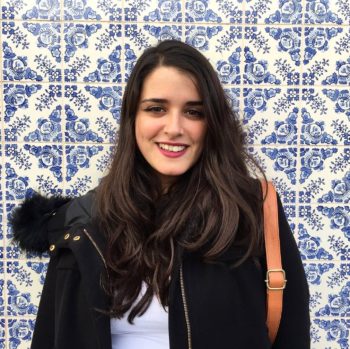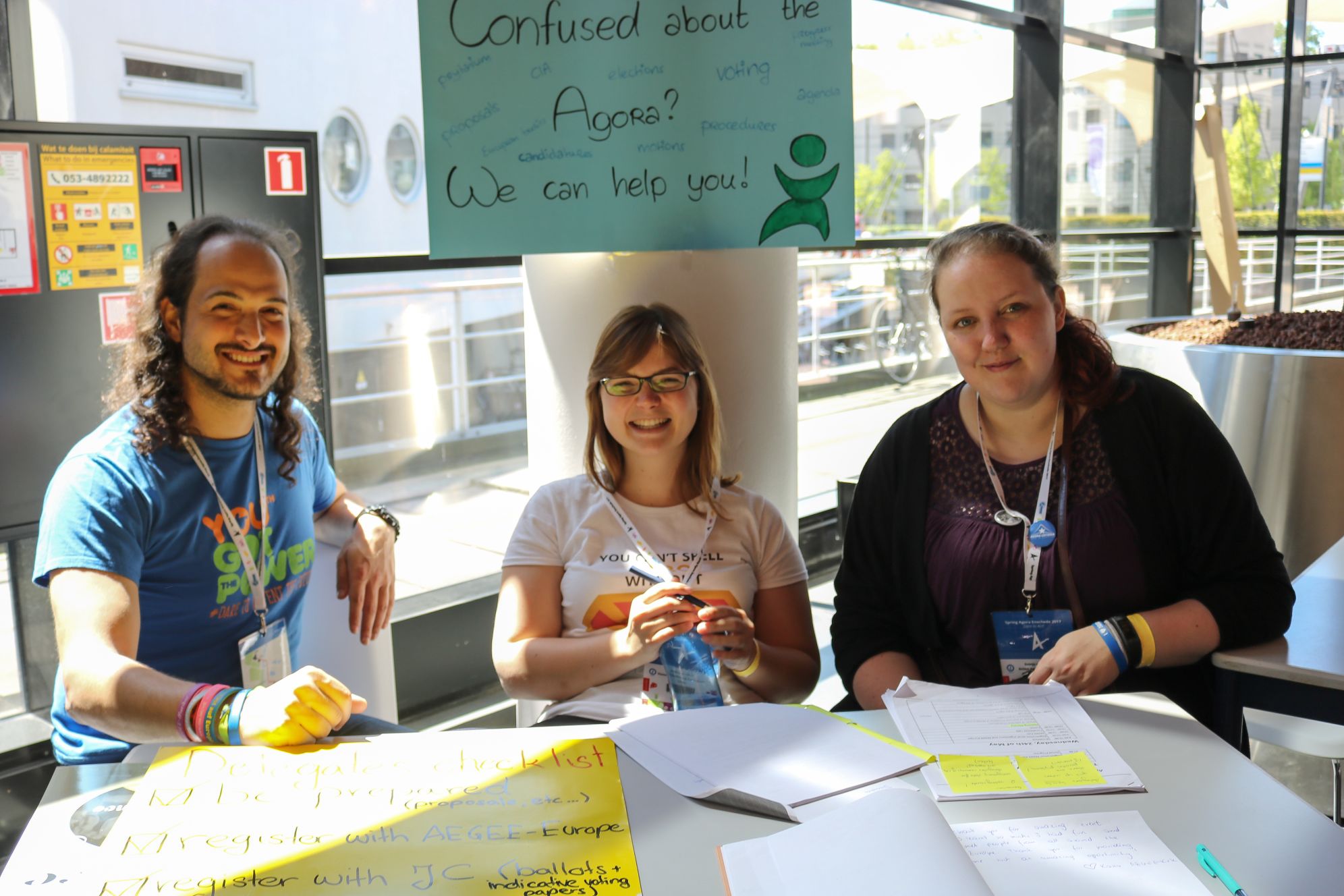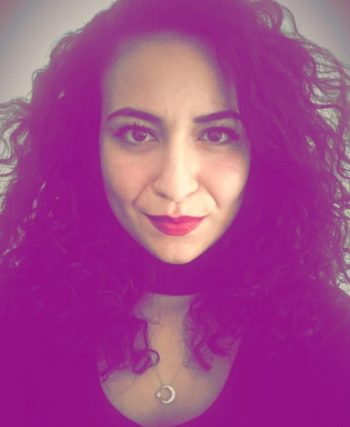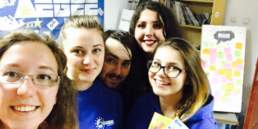You have never been to an Agora and want to go to Bucharest? You are an experienced AEGEE member and want to help Agora newbies, because you remember how lost you felt when it was your first time? Then apply for the Agora Mentorship Programme of the Human Resources Committee (HRC)! Like in the past years, the HRC will match experienced and fresh Agora participants. How that works in practice? Agora Mentorship experts Cristina de la Parte Rodriguez and Müge Güner will tell you more in this interview.
Golden Times: How many mentors are you looking for?
Cristina & Müge: Our goal for Spring Agora Bucuresti is to have at least 50 mentees, so ideally, we are looking for 50 mentors.

GT: And how should the perfect mentor be like?
Cristina & Müge: The perfect mentor is an AEGEEan who has attended an agora before and can explain to the mentee the different sessions of the event, who can assess him or her with the proposals and candidates and can give some survival tips.
GT: What will the mentee learn from the mentor? How much time do they usually spend together at an Agora?
Cristina & Müge: Since every mentor might have a different background and knowledge level, that might depend on the mentor. The main objective of the project is to help the mentees with learning what the Agora is and receiving enough explanations about what is going on or what to do. Our job here is to make sure that we have mentors that can provide enough basic information to a newbie.
GT: In the preparation phase before the Agora mentor and mentee are already in contact. How does that look in practice?
Cristina & Müge: After the selection of mentors and mentees we will match them, skype with them to welcome them and explain the next steps. Then we will create a Facebook group for the announcements and some icebreaking and introductory games. We will also be in touch with everyone on social platforms such as Whatsapp or Telegram, but we might decide together which one to use to give them an option to pick the easiest one for them. In addition to this, we will make sure that the mentees are in touch with their mentors via mail because it is important to have a connection between them beforehand, to build a relationship and to make them feel free to ask for help when needed.

GT: At previous Agoras, how many people applied for mentor and mentee?
Cristina & Müge: Unfortunately we don’t have any data for Agora Istanbul, but at Spring Agora Kraków 2018 the project received more than 70 applications for mentee and 30 applications for mentor, and at Autumn Agora Catania 2017 the number of applications for both positions were approximately the same.

GT: Will every mentee get a mentor?
Cristina & Müge: All mentees will get a mentor, since one mentor can have more than one mentee. Our goal and hope is to give every mentor one mentee to create a fruitful experience for both sides, because it takes more energy, focus, different knowledge levels and an individual communication style, if a mentor has to take care of several mentees with different backgrounds. Therefore, we would like to encourage our experienced members to apply for the mentor position to help our new friends with their first Agora experience!
GT: How does a mentor prepare for his or her role? Are there some guidelines?
Cristina & Müge: Since the mentors are experienced members, it is enough for them to know enough and be able to pass their knowledge about the Agora to the mentees. Aside from this, we expect them to have a close communication with the mentee or mentees and to explain the different aspects of the Agora, to make the mentees’ first Agora experience easy and unique. We are working on a document with tips about how to be a good mentor and we will be in close communication with them as well.
GT: What happens if a mentor suddenly doesn’t have time at the Agora due to other commitments? What can the mentee do?
Cristina & Müge: To be honest we expect our potential mentors to see this project as an important tool for knowledge transfer and understand that it is a responsibility. We have some standards in deciding whether the applicant meet the expectations or not and this is one of them. But in case there is an emergency and such thing happens, the mentor can inform us about the situation and we’ll make sure that our mentee is assigned to another mentor who can help during the Agora. Also, in case any mentee does not have any contact with his or her mentor, they can contact us or any member of the HRC to inform us and we will find another mentor. We will be at their disposal anytime!
GT: In general, what kind of feedback did mentors and mentees give after previous Agoras? Was there a proper evaluation?
Cristina & Müge: Yes, there are evaluation forms that have been used after previous editions of the project, to gather feedback from mentors and mentees. The most common suggestion was to check if the mentor-mentee couples communicate with each other and to have more time spent as mentor-mentee couples. There was also some feedback on having more intercultural groups, having a manual and more mentors attending Skype meetings.
GT: How can people apply for being mentor or mentee?
Cristina & Müge: There will be a form available after the selection results of the Agora get published. We will announce it via email to Announce-L, and we will publish it also on Facebook. So stay tuned!
GT: Anything you want to add?
Cristina & Müge: We are looking forward receiving your applications!
Related Posts
26th January 2019
EPM Izmir: “Private Flats for Participants”
From 6th to 10th of February 2019 Izmir will be the centre of the AEGEE world. Around 100 participants will gather for the European Planning Meeting (EPM), which will focus on the issue of sustainablity this year.
10th September 2018
Ștefania Ciuraru, Agora Bucuresti Coordinator: “The Protests in Our Country Motivated Us”
Finally there is a host for spring Agora 2019: today it was revealed the event will be organised by AEGEE-Bucuresti in May next year! The Golden Times just spoke with the main coordinator of the statutory event, Ștefania Ciuraru, who was President of the antenna from 2014 to 2016 and who is currently Treasurer of AEGEE-Bucuresti.
19th July 2018
Agora Istanbul 2018 Will Focus on Sustainability
From 2nd to 7th of October 2018 AEGEE-Istanbul will hosts its second Agora. Up to 800 people will be able to participate. At least 800. "We are also working on expanding the capacity to 1000 if there is a need", says main coordinator Dermansah.

